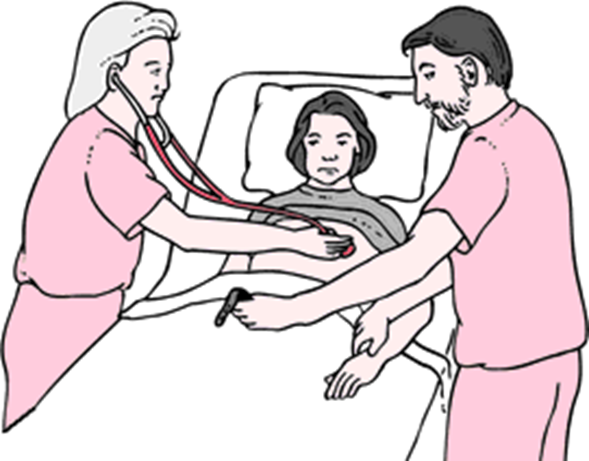A nurse is assessing a group of clients. For which of the following clients should the nurse make a referral to palliative care?
A client who is newly diagnosed with type 1 diabetes mellitus and cannot afford insulin.
A client who has Meniere's disease and cannot safely ambulate due to vertigo.
A client who had a stroke and cannot eat or drink without choking.
A client whose medications to manage Parkinson's disease are no longer effective.
The Correct Answer is D
Answer: D. A client whose medications to manage Parkinson's disease are no longer effective.
Rationale:
A) A client who is newly diagnosed with type 1 diabetes mellitus and cannot afford insulin:
While this client has a significant medical issue, the primary concern here is financial rather than palliative. Palliative care focuses on providing relief from symptoms and improving quality of life for those with serious illnesses. Addressing the client's financial issues might involve social services or community resources rather than palliative care.
B) A client who has Meniere's disease and cannot safely ambulate due to vertigo:
Meniere's disease, while debilitating, may not necessarily require palliative care unless the symptoms are severely impacting the client's quality of life in a way that is not manageable with current treatments. Palliative care could be considered if the disease is severely limiting function and other supportive care is needed.
C) A client who had a stroke and cannot eat or drink without choking:
This client is experiencing a significant functional impairment due to the stroke, which might benefit from rehabilitative services rather than palliative care. Palliative care would be more appropriate if the client's condition is progressive, severe, and not responsive to treatment, leading to a focus on comfort and quality of life.
D) A client whose medications to manage Parkinson's disease are no longer effective:
When medications for Parkinson's disease are no longer effective, the client may be experiencing advanced symptoms and a decline in quality of life. Palliative care can provide symptom management, support, and enhance the client's quality of life when conventional treatments are no longer effective in controlling symptoms.
Nursing Test Bank
Naxlex Comprehensive Predictor Exams
Related Questions
Correct Answer is C
Explanation
Answer: C. "Insert the entire needle into your skin to administer medication completely."
Rationale:
A) "Administer this medication into your leg muscle."
Enoxaparin should be administered subcutaneously, typically in the abdominal area, not into a muscle. Injecting it intramuscularly can lead to unpredictable absorption and increase the risk of bleeding.
B) "Expel the excess air in the syringe before you administer the medication."
This statement is incorrect. For enoxaparin, it is recommended to retain the air bubble in the syringe. The air bubble helps ensure the entire dose is delivered and minimizes leakage at the injection site.
C) "Insert the entire needle into your skin to administer medication completely."
This is an appropriate instruction as it emphasizes the need to fully insert the needle for effective subcutaneous delivery of enoxaparin. Proper technique is essential to ensure the medication is administered as intended.
D) "Take ibuprofen for fever following administration of this medication."
This recommendation is not advisable because ibuprofen, a non-steroidal anti-inflammatory drug (NSAID), can increase the risk of bleeding, especially when taken concurrently with enoxaparin. The client should consult their healthcare provider for safe alternatives for managing fever or pain.
Correct Answer is B
Explanation
Choice A rationale:
A capillary refill of less than 1 second is a normal finding and indicates adequate peripheral perfusion. It is not a cause for concern in this postoperative client.
Choice B rationale:

The presence of a pulse deficit should be reported to the provider because it suggests a discrepancy between the apical and radial pulses, indicating potential cardiovascular compromise or inadequate arterial perfusion.
Choice C rationale:
A systolic blood pressure 10 points lower than before surgery can be a normal response to anesthesia or surgery and may not necessarily require immediate reporting unless accompanied by other concerning symptoms or vital sign abnormalities.
Choice D rationale:
Pulse oximetry at 96% is within the normal range for oxygen saturation and does not warrant immediate reporting. However, if the client is experiencing respiratory distress or other concerning symptoms, it should be addressed promptly.
Whether you are a student looking to ace your exams or a practicing nurse seeking to enhance your expertise , our nursing education contents will empower you with the confidence and competence to make a difference in the lives of patients and become a respected leader in the healthcare field.
Visit Naxlex, invest in your future and unlock endless possibilities with our unparalleled nursing education contents today
Report Wrong Answer on the Current Question
Do you disagree with the answer? If yes, what is your expected answer? Explain.
Kindly be descriptive with the issue you are facing.
